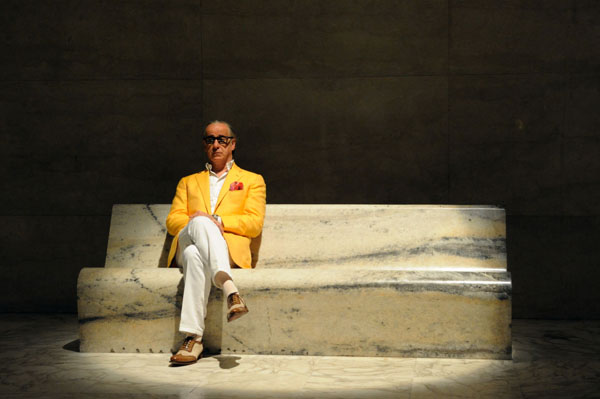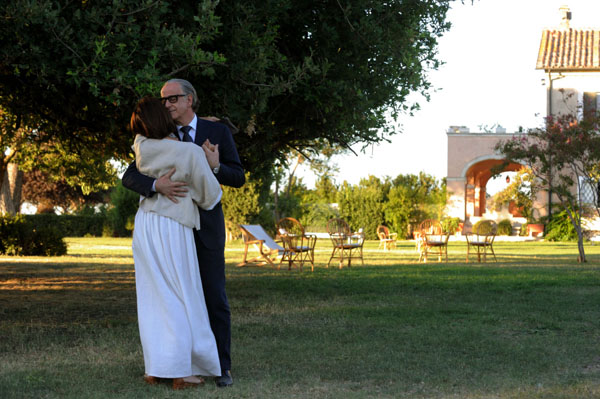The Great Beauty, the latest from Paolo Sorrentino, premiering in Competition, is “a gentle and sentimental mirror image of La Dolce Vita for the present age,” suggests Barbara Scharres at RogerEbert.com. “While Fellini’s film has a young man immersing himself in the decadence of Roman society and experiencing the death of the soul, Sorrentino’s film depicts a man on the brink of old age looking ahead to the death of the body but finding a resurgence of his artistic power. The film is a magical tour of underground Rome as bon vivant socialite Jep Gambardella, a kindly 65-year-old man of means with one successful published novel in his past, walks through the locations of his life as a kind of social drifter. Sorrentino creates visual poetry from the beauty of plazas, churches, parks, and palaces where Jep has passing encounters with friends.”
David Jenkins at Little White Lies: “A typically astounding Toni Sevillo stands in as Sorrentino’s louche manqué, a weekend writer, immaculately turned-out, Byron-esque libertine whose 65th birthday triggers a series of angsty recollections about how differently his life may have turned out had he settled down with a woman who secretly worshipped him for afar. On purely stylistic terms, Sorrentino has produced another film which glides along on tracks and dollies, hopping between the realms of dream, reality and fantasy with gleeful abandon…. He jam-packs episodes with symbols, juxtapositions and even magical realist asides, overloading the viewer with information while never hampering to the clichés of the existential crisis movie.”
“In the 1960s,” notes the Guardian‘s Peter Bradshaw, “the great Pauline Kael famously described this kind of Italian movie as a ‘come-dressed-as-the-sick-soul-of-Europe party,’ and at the time, the spoiled partygoers looked as if they were a dying breed. But they weren’t. Right now, in 2013, La Grande Bellezza looks like a ‘come-dressed-as-the-fantastically-vigorous-and-unrepentantly-hedonistic-soul-of-rich-Europe party.’ There is an muscular and almost fanatical vitality in the party scenes, and even the quieter moments: the art exhibition, the funeral…. It is a brilliantly executed, glitteringly hypnotic film, though, one of the very best in the festival and it is time for Toni Servillo to get his best actor award here.”
Deborah Young in the Hollywood Reporter: “Though Sorrentino’s vision of moral chaos and disorder, spiritual and emotional emptiness at this moment in time is even darker than Fellini’s (though Ettore Scola’s The Terrace certainly comes in somewhere), he describes it all in a pleasingly creative way that pulls audiences in through humor and excess.”
Lee Marshall in Screen: “With its venal clerics, failed authors, aristocrats for rent, washed-up TV stars and shabby nightlife entrepreneurs, The Great Beauty is, at times, a profound film about superficiality, loss of innocence, missed chances and imitations of life; but at others it recycles a vision of Rome, and a fashionable ennui, that Fellini nailed once and for all more than 50 years ago…. The film’s tone is set by an opening on-screen quotation from French writer Celine’s bitterly misanthropic 1930s novel Journey to the End of the Night. But it might just have easily have led with a bon mot Gore Vidal comes up with in Fellini’s Roma: ‘Rome is a wonderful place from which to observe the end of the world.'”
And Variety‘s Jay Weissberg has the Celine quote: “Our journey is entirely imaginary. That is its strength.” And he adds: “As with Il Divo and This Must Be the Place, Sorrentino continues to tackle major topics using an extraordinary combination of broad brushstrokes and minute detail. Passion via the intellect has become his trademark, well suited to this dissection of empty diversions, indulged in by latter-day Neros fiddling while Rome burns.”
The festival’s got audio from the press conference.
Updates: Sorrentino “works in an emphatic, free-associative mode unlike that of just about any other international auteur right now,” writes Mike D’Angelo at the AV Club: “the whirlwind of quick cuts and lurching camera moves that open The Great Beauty is hyperactive even by his standards. The insanity has a purpose, however—its sudden grind to a halt, like a cassette tape being eaten by rollers, is surpassingly eerie—and once the film settles down, it becomes a rollicking yet melancholy tour of a city so spectacular and historic that it paralyzes its inhabitants.”
“For much of The Great Beauty,” writes Time Out London‘s Dave Calhoun, “it feels like the film may only ever be a thrilling dip into a strange, rarefied world—a world where botox is on sale at high-class clubs and a mysterious man with a briefcase full of keys gives the privileged access to Rome’s galleries in the dead of the night. But when the party slows down and the music begins to fade, The Great Beauty creeps up on us, just as life is creeping up on Jep. It’s an exploration of all things surface, yes, but it has soul too.”
The Playlist‘s Kevin Jagernauth finds “it doesn’t quite gel into a cohesive whole,” and he gives it a B.
Updates, 5/23: “It’s got gassiness, self-indulgence, incoherence equal to Fellini’s,” writes Wesley Morris at Grantland. “This movie also has all of Berlusconi-era Italy to work with, and Sorrentino treats the times like a vast forest fire that simply has to burn itself out before anything good can grow in its place.”
Camillo De Marco interviews Sorrentino for Cineuropa.
Update, 5/24: “It is a sprawling and, in some cases indulgent, film, but one that is also incredibly passionate about cinema,” writes Chuck Tryon at Filmmaker.
Update, 5/26: “The Great Beauty isn’t about storytelling,” says Jonathan Romney in a Film Comment roundtable. “I think what he’s doing is trying to create what you could call a city symphony film about Rome, and it’s my favorite film here. It was euphoric and gave an absolutely firework-like display just in the pure joy of creating images. Whether ultimately it is anything more than an elaborate and beautiful imagistic remix of La Dolce Vita I think posterity will tell, but for now I think it’s an extraordinary experience.”
Update, 5/27: “Like Sorrentino’s corrosive comedy The Family Friend, the new film sees old men as vampires who sustain themselves by supping on the vitality of the young,” write Richard and Mary Corliss for Time. “And like Il Divo, his acid-etched portrait of Italian Prime Minister Giulio Andreotti, The Great Beauty mixes journalism and satire. The odd and saving additions: an affection for nearly all of its outsize characters, and a melancholy that the flaming creatures of his acquaintance will soon burn out. Jep’s oldest friend, the aging poet Romano (Carolo Verdone), gets to this point when he asks, ‘What’s the matter with nostalgia? It’s the only thing left for those of us who have no faith in the future.’ Participants at Cannes this year, who found just a middling slate of films, may be forgiven for having little faith in Cinema Present. But The Great Beauty, an essay on nostalgia, gives even the cynics a faith in the vibrancy of movies and the reviving artistry of Paolo Sorrentino.”
Update, 5/31: “The great thing about La Grande Bellezza is that, once you get on its wavelength, you soon recognize that if one sequence isn’t doing it for you, the next one might,” notes Jordan Hoffman at Film.com. “At two-and-a-half hours Sorrentino offers up a maximalists’ delight.”
Update, 6/14: At Filmmaker, Ariston Anderson has five questions for Sorrentino.
Cannes 2013 Index. And you can watch over 100 films that have seen their premieres in Cannes right here on Fandor. For news and tips throughout the day every day, follow @KeyframeDaily on Twitter and/or the RSS feed. Get Keyframe Daily in your inbox by signing in at fandor.com/daily.





